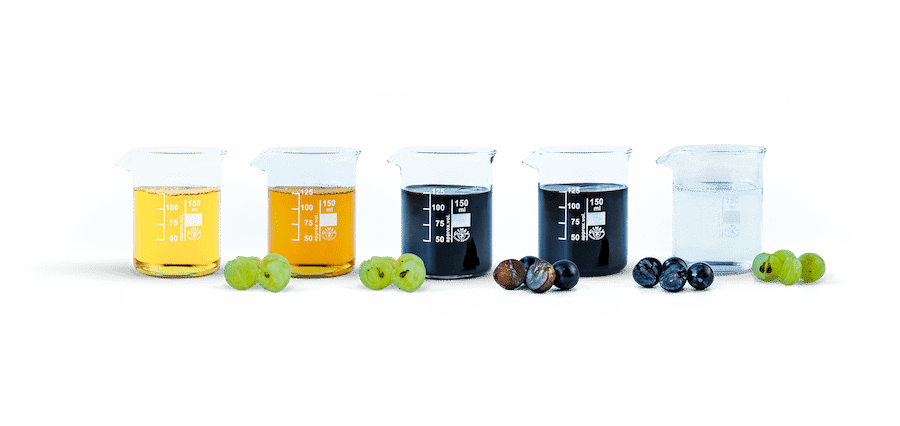In the health food and beverage industry, pineapple and grape juice concentrates are ingredients used to deliver nutritious and functional products to consumers. Both juices represent intensely flavored alternatives that capture the aromas, flavors and vitamins of fresh fruit, thereby offering health benefits that align with current fitness trends. Pineapple juice concentrate is highly popular for its tropical profile, while grape juice concentrate has a robust flavor associated especially with winemaking. But its capabilities and properties go beyond that. And today we decided to explore them.
In this article we present a broad overview of pineapple and grape concentrates. We explain their important applications in the food and beverage industry and describe each of their health-enhancing and disease-preventing properties.
- Pineapple juice concentrate in the food and beverage industry
- Concentrated juice of white and red grapes
- Julián Soler: 100% authentic, sustainable grape juice concentrate
Pineapple juice concentrate in the food and beverage industry
Pineapple juice concentrate is a viscous juice with a concentration between 59 and 61° Brix, which preserves the organoleptic and nutritional properties of the fruit. Its color is bright yellow or dark yellow with brownish tones, depending on the maturity of the fruit..
To obtain it, first of all, the fresh and ripe pineapple pulp is pressed to obtain the non-concentrated juice. This juice is then processed using a vacuum evaporation system to eliminate a percentage of its water content at a controlled temperature. In this way, the quality of the pineapple can be fully preserved, the intensity of its aroma and flavor and the high content of vitamins and minerals are maintained.
Pineapple juice concentrate in the food industry
Pineapple concentrate is versatile and is used in a wide range of applications in the food and beverage industry.
| Some uses of pineapple juice concentrate |
| It has few calories, so it is widely used in the preparation of dietary and healthy products, such as smoothies and flavored teas. |
| Its tropical and fresh flavor is in great demand for flavoring alcoholic and non-alcoholic cocktails, nectars, fruit juices, soft drinks, yogurts, ice creams, cakes, fillings and toppings. |
| Because of its nutrients, pineapple juice concentrate is used to make indulgent delicacies, i.e. to reformulate some traditionally unhealthy foods, such as ice cream, cakes, cookies, so that they can offer consumers positive nutrition. |
| Pineapple concentrate is also used to improve the nutritional profile of dried fruits and energy bars. In the gourmet kitchen, it is also used to prepare sauces and dressings for meat, fish and salads. |
Properties of pineapple juice concentrate and how it benefits the body
Pineapple juice concentrate contains health-promoting nutrients. It is especially rich in manganese, vitamin C, vitamin B6 and copper, compounds that play an essential role in strengthening the immune system, wound healing and energy production. This concentrate is also a source of antioxidants, helping to protect the body from cell damage. In addition, the presence of bromelain, an enzyme that helps reduce inflammation, supports the digestive system and alleviates cardiovascular disorders, stands out.
Among the main properties of pineapple juice concentrate are the following:
- Ability to improve digestion. Its enzymes break down proteins into very small units, converting them into tiny peptides and amino acids so that they are easily absorbed by the intestine. In addition, research published in the National Center for Biotechnology Information NCBI suggests that pineapple bromelain helps protect the intestine from harmful bacteria that cause diarrhea.
- Anti-inflammatory properties. Studies published in NCBI specify that the bromeliad in pineapple juice can be as effective in relieving inflammation as non-steroidal anti-inflammatory drugs. Even with fewer side effects. So it offers great benefits to relieve bronchitis, sinusitis, angina pectoris and osteoarthritis.
- Skin protection. The vitamin C in pineapple juice is a powerful antioxidant and promotes collagen production, thereby aiding in the production of new skin cells.
Concentrated juice of white and red grapes

Grape concentrate, white or red, is a sweet, thick and intensely flavored elixir that preserves the essence, nutrients and organoleptic properties of the fruit. It is made through a meticulous process, in which the grapes are selected at their optimum point of ripeness and gently pressed to obtain the first non-concentrated juice (must flower). The juice is then subjected to evaporation and filtering methods. Finally, a grape concentrate between 65 and 68° Brix is obtained.
Grape juice concentrate is a 100% natural product and very versatile, being able to offer different concentrations and shades, for example:
- White concentrated grape juice, with a bright yellow color.
- Concentrated white grape juice concentrate, with a lighter yellow color.
- Red concentrated grape juice, with a dark cherry color.
- Red concentrated grape juice with a high color (Garnacha tintorera variety). Its unique color is a mixture of intense cherry tones.
Grape juice concentrate in the food industry
Because of its nutritional profile and organoleptic properties, grape juice concentrate is one of the multifaceted ingredients most appreciated by the industry to create healthy, attractive and indulgent products that are not only pleasing to the palate, but also promote the well-being of the organism. This juice is able to provide nutrients, natural sugars, natural color, antioxidants and bioactive compounds to multiple types of foods and beverages to enhance their quality and increase their commercial value.
| Some uses of white or red grape juice concentrate |
| Its high sweetening power makes it a natural alternative for sweetening sports drinks, juices, cookies, jams, energy bars, dietary supplements and baby food. |
| Thanks to its natural sugars, grape juice concentrate has preservative properties that help extend the shelf life of various fruit juices, nectars, jams, etc. |
| Because it is rich in nutrients, it is used to strengthen various food products, such as yogurts, desserts, smoothies, flours, etc. |
| It is a powerful natural colorant, so it is used to make soft drinks, jellies, energy drinks, ice cream, jams, etc. more attractive. |
| The natural sugars, minerals, vitamins and antioxidants in grape concentrate provide energy and sports drinks with the necessary properties for rehydration and biological replenishment of the body after physical exercise. |
| Enhances the flavors and aromas of confectionery products, glazed creams, fillings, etc. |
| It raises the nutritional values of baby foods, such as purees, porridges, cereals and juices. In addition, as it is a natural sweetener, it allows sweetening children’s drinks and, at the same time, helps them to maintain a healthy weight. |
On the other hand, the versatility and nutritional richness of concentrated grape juice makes it an ingredient that drives the development of food innovation and can turn every mouthful into a memorable experience, with great benefits for the body.
Properties of grape concentrate and its health benefits
The concentrated juices of red and white grapes are rich in vitamins A, E, C and K. They also contain multiple minerals, such as iron, potassium, calcium, magnesium and phosphorus. In addition, thanks to its natural sugars (fructose and glucose, without sucrose), it is a source of energy for muscles undergoing high-performance physical training. This juice concentrate stands out mainly for its high levels of antioxidants, especially resveratrol, a compound with anti-inflammatory, antimicrobial and anticarcinogenic properties, which protects the body from various diseases.

Here are some of the health-promoting properties of grape juice:
- Ability to prevent neurodegenerative diseases. According to research published in the scientific portal SciencieDirect, the resveratrol present in grapes and their derivatives plays a key role in the prevention of diseases such as AD, cerebral ischemia, Parkinson’s disease and Huntington’s disease. On the other hand, grape juice supplementation can help improve memory in older adults with mild cognitive impairment.
- Improve the immune system. Specifically, grape juice helps reduce viral infections. It has the ability to prevent the reproduction of the virus that generates influenza. It also inhibits various pathogenic viruses, such as poliovirus and Epstein-Barr virus.
- Promote digestive system health. The polyphenols present in grape juice help balance the intestinal microbiota:
- Promote the growth of beneficial bacteria in the intestine to improve digestion and nutrient assimilation.
- Inhibit the growth of pathogenic bacteria.
- They help prevent inflammation and colon cancer.
- Protect skin. Grape juice concentrate contains vitamin C, resveratrol and malic acid, so it has anti-wrinkle and anti-aging properties that repair the skin and give it luminosity. They can also prevent dermal cell degradation.
Julián Soler: 100% authentic, sustainable grape juice concentrate
We are leaders in the global production and distribution of white and red concentrated grape juice, free of SO2, additives and allergens. We deliver high quality must all year round, thanks to our storage, refrigeration and freezing capacity. In addition, we have an exclusive process that preserves the natural sugars, colorants and acids of the grapes.
At JULIAN SOLER we apply our know-how to guarantee the quality and food safety of our grape juice concentrate at all times. We carry out strict control, classification and analysis processes in our laboratory, which is equipped with state-of-the-art technology. We also have an R&D&I department to promote the development of food innovations, together with our customers.
We are your Global Grape Solution Supplier. Request information, or a sample, with no obligation.
Principales fuentes: National Center for Biotechnology InformationNCBI, SciencieDirect, Julian Soler, Healthline.




 by
by